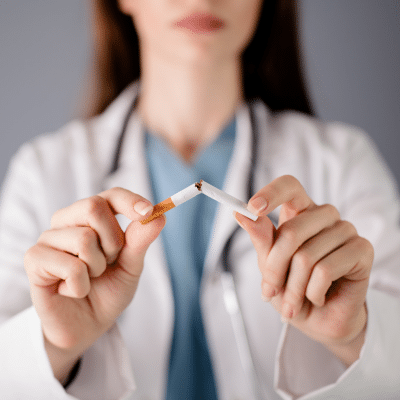 Smoking and tobacco use have long been linked to serious health risks, from lung cancer to heart disease. However, their impact on oral health is equally significant. At Fair Lakes Family and Cosmetic Dentistry in Fairfax, VA, we aim to educate our patients on how smoking and tobacco affect the mouth, gums and teeth. Understanding these effects can help patients in Fairfax, Oakton, Burke and Vienna, VA make informed decisions for a healthier smile.
Smoking and tobacco use have long been linked to serious health risks, from lung cancer to heart disease. However, their impact on oral health is equally significant. At Fair Lakes Family and Cosmetic Dentistry in Fairfax, VA, we aim to educate our patients on how smoking and tobacco affect the mouth, gums and teeth. Understanding these effects can help patients in Fairfax, Oakton, Burke and Vienna, VA make informed decisions for a healthier smile.
Stained Teeth and Persistent Bad Breath
One of the most visible effects of smoking is stained teeth. The tar and nicotine in tobacco can lead to yellow or brown discoloration, which may become more pronounced over time. Even with good oral hygiene, these stains are difficult to remove without professional whitening treatments.
Moreover, smoking often results in bad breath, known as halitosis. The chemicals in cigarettes cause dry mouth, reducing saliva production. Since saliva helps wash away bacteria and food particles, its reduction can lead to lingering bad odors and an unpleasant taste in the mouth.
Higher Risk of Gum Disease
Gum disease, or periodontal disease, is more common and severe in smokers. Tobacco chemicals weaken the immune system, reducing the body’s ability to combat infections. As a result, smokers are more susceptible to gum infections, starting with gingivitis and potentially progressing to periodontitis, a serious condition that can lead to tooth loss.
Since smoking reduces blood flow to the gums, it can also mask the symptoms of gum disease, such as bleeding gums. This makes it harder to detect the condition until it has progressed, increasing the risk of more severe dental issues.
Slower Healing After Dental Procedures
Tobacco use hinders the body’s ability to heal. For smokers, this means that recovering from dental procedures like extractions, implants, or gum surgery can take longer. The chemicals in tobacco restrict blood flow to the gums, leading to slower healing and a higher risk of complications like infections.
For those planning major dental work, dentists often recommend quitting smoking, at least temporarily, to improve healing outcomes.
Increased Risk of Oral Cancer
One of the most serious consequences of tobacco use is an increased risk of oral cancer. Smoking and smokeless tobacco both introduce harmful chemicals into the mouth, which can lead to cancer of the lips, tongue, throat and cheeks. The longer someone uses tobacco, the higher their risk becomes.
Oral cancer can become life-threatening if it isn’t detected and treated early. Regular dental check-ups often include screenings for oral cancer, which is why it’s crucial for smokers and tobacco users to maintain consistent dental visits.
Tooth Decay and Loss
Smoking promotes the buildup of plaque and tartar on teeth, increasing the likelihood of tooth decay. Additionally, nicotine affects saliva flow, leading to a drier mouth. Since saliva helps neutralize acids produced by bacteria, a lack of it results in a more acidic environment, which can cause cavities and tooth erosion.
Chewing tobacco also poses a risk. Many smokeless tobacco products contain sugar, which can lead to decay, especially around the gum line, where the product is often placed.
Reduced Sense of Taste and Smell
Smoking dulls the sense of taste and smell, which may lead to a less enjoyable eating experience. Over time, smokers might find it harder to detect subtle flavors in food or recognize changes in the environment, such as gas leaks or smoke, which can affect overall quality of life.
The Misconception of Smokeless Tobacco
Some believe that smokeless tobacco is a safer alternative to smoking. However, it poses its own set of risks, including an increased chance of developing gum disease, tooth decay and oral cancer. It can also cause leukoplakia, white patches inside the mouth that can be precancerous. The use of smokeless tobacco still exposes the mouth to harmful chemicals, proving it is not a safe option.
The Benefits of Quitting Smoking
Quitting smoking brings immediate benefits to oral health. Within weeks of stopping, individuals often notice fresher breath and improved taste sensations. Over time, the risk of gum disease, oral cancer and other oral health issues will significantly decrease. Additionally, quitting smoking can enhance the success rate of dental procedures and promote faster healing.
For those who are considering quitting, here are a few tips:
- Seek Support: Counseling, support groups and hotlines can provide guidance and encouragement.
- Nicotine Alternatives: Patches, gum, or lozenges can help manage cravings during the transition period.
- Healthy Habits: Staying active and finding new hobbies can distract from the urge to smoke.
- Regular Dental Visits: Routine check-ups can help track improvements in oral health and offer support in quitting.
Request Your Appointment in Fairfax, VA Today
Smoking and tobacco use can cause serious damage to oral health, from staining and bad breath to life-threatening conditions like oral cancer. At Fair Lakes Family and Cosmetic Dentistry in Fairfax, VA, we encourage all patients to understand these risks and seek support to quit if they use tobacco. Regular dental check-ups, paired with good oral hygiene, are essential for maintaining a healthy, bright smile, especially for those who smoke or use tobacco.
If you have concerns about how smoking affects your oral health or need support in quitting, Fairlakes Family and Cosmetic Dentistry is here to help. Request your appointment today.
